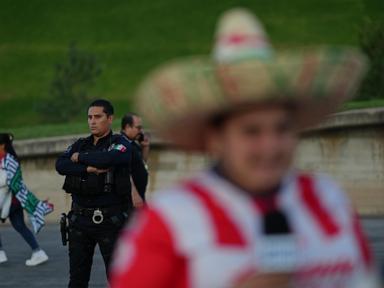World
Soccer Excitement Meets Harsh Reality of Violence in Jalisco

In the lead-up to the 2026 FIFA World Cup, soccer enthusiasts in Zapopan, a city near Guadalajara, celebrated with chants of “Mexico! Mexico!” as they navigated through layers of security. This included police officers, bomb-sniffing dogs, and drone jammers. Just a few miles away, the scene was vastly different. National Guard troops monitored the area as volunteers searched an abandoned house for the remains of some of Mexico’s 134,000 missing persons. The stark juxtaposition of fervent sports enthusiasm and the grim reality of cartel violence highlights the complex situation in the state of Jalisco.
Jalisco, which will host four World Cup matches in June 2026, is under the shadow of the powerful Jalisco New Generation Cartel (CJNG). This criminal organization is believed to have around 19,000 members and operates in 21 of Mexico’s 32 states. With a population of 8 million, Jalisco has the highest number of disappearances in the country and ranks among the top four states for crime rates. As of October 2023, approximately 1,000 disappearances were reported in the state, marking a 30% increase compared to the previous year, according to data from Mexico’s National Search Commission.
Despite the persistent violence, fans attending the recent friendly match between Mexico and Ecuador expressed little concern about the cartel’s presence. Many believe that major events like the World Cup provide a temporary sense of security. “If you don’t get yourself into trouble, nothing will happen,” said Javier Rodríguez, an 18-year-old college student heading to the stadium.
Contrasting Efforts: Security and Search for the Missing
In stark contrast to the jubilant atmosphere of the soccer event, volunteer searchers like Indira Navarro and her team from the Jalisco Search Warriors continue their grim work in the region. They excavated a concrete slab behind an abandoned house after receiving a tip that human remains could be buried there. Their mission is driven by personal loss; Navarro is searching for her brother, who disappeared in Sonora in 2015.
Earlier this year, her group unearthed hundreds of garments and burned bone fragments at a site previously raided by authorities. This discovery raised questions about the thoroughness of the initial investigation into what was believed to be a cartel recruitment and training ground. Navarro has since received death threats, prompting the National Guard to provide her with round-the-clock protection.
The CJNG has gained notoriety for its violent tactics, including attacking authorities with military-grade weaponry. In 2023, the organization was designated a foreign terrorist organization by the Trump administration. Security experts note that no criminal group has wielded such power in Jalisco since the late 1980s, a time when Guadalajara last hosted international matches during the 1986 World Cup.
Official Perspectives on Security and the Future
Local officials, including Roberto Alarcón, Jalisco’s state security strategy coordinator, attempt to downplay the cartel’s influence. Alarcón claims that the lack of multiple criminal organizations in the region allows security authorities to manage the situation more effectively. He noted that major crimes in Jalisco are trending downward despite the ongoing violence.
Security analyst David Saucedo anticipates a temporary agreement between the cartel and government forces, where law enforcement may refrain from significant operations against cartel leaders as long as the cartel avoids high-profile incidents. He cautions, however, that this truce does not mean the cartel will cease its criminal activities. Rather, it may exploit the World Cup to enhance operations in areas such as casinos and street-level drug sales.
A day before the friendly match on October 14, 2023, Jalisco Governor Pablo Lemus and local officials highlighted the economic benefits of the World Cup, projecting revenues of $1 billion and the creation of up to 7,000 jobs in tourism and construction. In preparation for the event, Jalisco is expanding its surveillance infrastructure, adding 3,000 additional cameras, which will bring the total to over 10,000.
Despite these optimistic projections, the social ramifications cannot be overlooked. Johana Jaramillo, an event producer at a fan zone, reflected on the paradox of hosting a major international event amid widespread violence. “These events help slightly repair social pain and bring the opportunity for better security measures simply because so many people are attending,” she said.
For individuals like Navarro, the excitement surrounding the World Cup feels like a façade, obscuring the ongoing struggle against violence and the search for justice. “They want to wash away everything that has to do with the issue of the disappeared,” Navarro stated. “But they won’t be able to do so because we’re going to continue fighting.”
As the 2026 FIFA World Cup approaches, the juxtaposition of celebration and sorrow in Jalisco serves as a poignant reminder of the complexities facing communities grappling with violence while also seeking to showcase their culture on a global stage.
-

 Science2 weeks ago
Science2 weeks agoInterstellar Object 3I/ATLAS Emits Unique Metal Alloy, Says Scientist
-

 Politics3 weeks ago
Politics3 weeks agoAfghan Refugee Detained by ICE After Asylum Hearing in New York
-

 Business2 weeks ago
Business2 weeks agoIconic Sand Dollar Social Club Listed for $3 Million in Folly Beach
-

 Health3 weeks ago
Health3 weeks agoPeptilogics Secures $78 Million to Combat Prosthetic Joint Infections
-

 Science2 weeks ago
Science2 weeks agoResearchers Achieve Fastest Genome Sequencing in Under Four Hours
-

 Lifestyle3 weeks ago
Lifestyle3 weeks agoJump for Good: San Clemente Pier Fundraiser Allows Legal Leaps
-

 Health2 weeks ago
Health2 weeks agoResearcher Uncovers Zika Virus Pathway to Placenta Using Nanotubes
-

 World3 weeks ago
World3 weeks agoUS Passport Ranks Drop Out of Top 10 for First Time Ever
-

 Top Stories2 weeks ago
Top Stories2 weeks agoChicago Symphony Orchestra Dazzles with Berlioz Under Mäkelä
-

 Business3 weeks ago
Business3 weeks agoSan Jose High-Rise Faces Foreclosure Over $182.5 Million Loan
-

 Entertainment3 weeks ago
Entertainment3 weeks agoJennifer Lopez Addresses A-Rod Split in Candid Interview
-

 World2 weeks ago
World2 weeks agoRegional Pilots’ Salaries Surge to Six Figures in 2025









